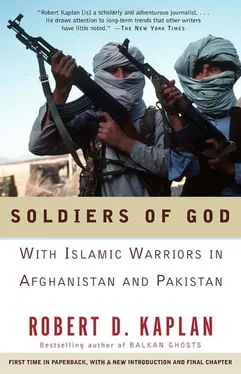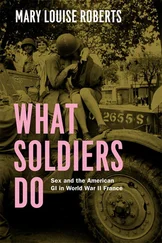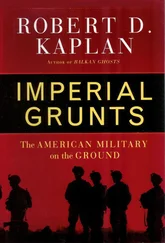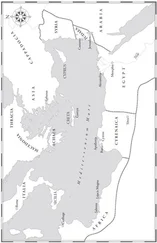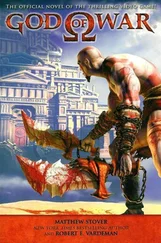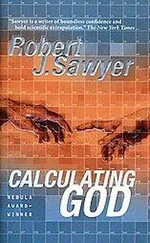Hamid eventually left for Kabul on his own, using his brother’s identity card, to find out what was causing Haq’s delay. Hamid promised to send for Gunston when he arrived. Though the wait was nerve-racking, it was without physical hardships. “Hamid insisted on living well,” said Gunston. “When we first got to Kolangar, the food was okay, but Hamid always sent it back, shouting and complaining. Then the food got exceptionally good — for Afghanistan, I mean. The man was nothing if not resourceful. He could stretch the law of hospitality quite far.”
Gunston spent three weeks in Kolangar, but Hamid was as good as his word. A civilian sedan finally arrived, driven by an Afghan army major who secretly worked for Abdul Haq. Gunston was stuffed into a specially built secret compartment in the trunk with an air hole and view outside. “The muj kissed a copy of the Koran as we left,” Gunston said. “I rather selfconsciously crossed myself.” Hamid put on a pair of Christian Dior sunglasses and sprayed himself liberally with perfume. He intended to run the gauntlet into Kabul disguised as a rich trader.
On the road to Kabul, the car fell in behind a Soviet convoy of tanks, trucks, artillery, and airborne troops in armored personnel carriers who were firing long bursts of cannon into the surrounding farm area, trying to provide cover for a retreating group of comrades on their way back to the Soviet Union.
After passing through two checkpoints, the car was abruptly flagged down by three Soviet paratroopers led by a junior sergeant with a Lenin badge on his khaki shirt, the kind awarded for meritorious service to the Party. The three, who were on their way out of Afghanistan, offered to sell Gunston’s driver a toolbox for 150 afghanis (under $1). Rather than arousing suspicion by giving them the brush-off or buying the toolbox for the asking price, the driver haggled noisily with the paratroopers until he got the price down to 100 afghanis — while Gunston crouched in the secret compartment. “I was shaking with fear,” Gunston told me. “I wanted to shout, ‘Take it for 150 afghanis, man. Just get us out of here!’ “ But his fear didn’t stop him from snapping away with his camera through the view hole.
At the last checkpoint, Afghan Communist troops were looking under the seats and even unscrewing the door panels of the other cars. But as it turned out, Gunston’s driver knew one of the guards, a cousin of a friend, and the vehicle passed into the city without a search.
“At a bus station, an Afghan army major in full uniform greeted us with embraces. We ducked into his waiting Volga staff car — courtesy of the Afghan Ministry of Defense, where the major worked — and drove to the safe house. We were saluted at all the checkpoints. Wearing civilian clothes, I was taken for just another Russian out for a drive with his Afghan comrade.”
Hamid, meanwhile, put on a three-piece suit with flared trousers and platform shoes for his clandestine meeting.
One of the safe houses where Gunston was hidden in the capital was right near the Soviet embassy. It was there that he interviewed an Afghan army general and a KhAD captain, both members of Haq’s underground. The general gave Gunston a bottle of Russian vodka to take back to Pakistan with him.
The reason the vehicle that was to take Gunston into Kabul had not arrived in Kolangar on time had to do with Abdul Haq’s temperamental aide-de-camp, Khairullah. The youngest son of a wealthy Jalalabad trading family, Khairullah had literally been given to Haq as one of the family’s many contributions to the jihad against the Soviets — in sort of the same way that sons are still given to the church to become monks in Orthodox Christian countries. Khairullah was a tall, elegant, urbanized guerrilla much like Hamid, with wavy, light brown hair and a mustache instead of a beard. Hamid and Khairullah had business dealings together in Pakistan, and they had had a falling out over money prior to Gunston’s departure over the border. Khairullah threw a temper tantrum and deliberately did not send Haq’s message to Kabul ordering the car and driver. With his bear paw of a hand slapping back and forth across Khairullah’s face, Haq later beat the whole tale out of him in front of an office full of mujahidin. Khairullah left in tears, utterly humiliated. Beating subordinates in front of others was something that the big, soft-spoken commander did frequently.
This episode spoke volumes about the problems Abdul Haq was encountering, more and more, since the mine injury had forced him to remain in Peshawar. Unable to communicate face to face with his Kabul-area network, he was losing his grip on it. Haq tried to compensate through increased efficiency. He kept more detailed files on dozens of subcommanders. He dispatched more messages to the field, using hand-carried messages and a cipher machine with a complicated number code he had thought up himself. He had his Tajik accountant monitor more closely the flow of money that kept the Kabul front going. Lumbering around his office like an injured football linebacker with a nervous, fatigued look on his face, Haq became compulsive about every facet of organization. He would send me a written note just to change the time of our next meeting by fifteen minutes. Such fastidiousness was not all that common in my own culture, and in the midst of the chaos of the Pathan world it seemed utterly bizarre.
Haq was not a happy man when I first got to know him. He confided much more to Gunston than he would to me. Still, Gunston was close to Haq only as one brave soldier could be to another.
It hadn’t taken Abdul Haq more than a few seconds to see beyond Gunston’s spiffy, boyish exterior to the sterner stuff beneath. In 1983, after meeting with Savik Shuster, a Lithuanian Jew and former Soviet citizen, Haq, an extremely devout Moslem at war with the Soviet Union, trusted him enough to arrange a series of trips inside for him.
“At first, I didn’t tell Abdul Haq that I was Jewish,” Shuster told me. “I wasn’t sure how he would react. When I did tell him, I quickly mentioned that I was an agnostic, that I didn’t really believe in God. This second admission made him suddenly angry. ‘Now you sound like a Soviet,’ he said. So I told him, as kind of an apology, that I questioned everything in life, but that I was prepared to accept the existence of God. Eventually, Abdul Haq learned to live with my disbelief.”
Shuster took risks inside that not even Gunston would take. If Gunston had been caught, the Afghan government would have accused him of spying and sent him to Kabul’s infamous Pul-i-Charki prison, where he would have experienced several months of terror until the British government struck a behind-the-scenes bargain for his release. Shuster, who had lived in the Soviet Union until he was twenty, would simply have been shot.
“I was scared out of my mind by the things I did, sure.” Shuster, who was thirty-five, always talked with the wry, self-questioning grin of an Eastern European intellectual. Growing up in the Soviet Republic of Lithuania had provided him with wisdom and pessimism in abundant amounts. Shuster seemed much older than his years. His eyes had a warm, intimate glow common to exiled Eastern Europeans, whose outer lives have been so restricted that their inner ones have taken on an ornate texture and symbolism that few in the West could approximate. He had dark curly hair, a dark complexion, and thin aviator glasses. Sometimes, because of the way his eyes lit up like sparks whenever he talked, he reminded me of Einstein.
Shuster claimed he did what he did in Afghanistan “out of historical memory.” He considered himself a “Lithuanian nationalist.” He could draw many parallels between the Soviet rape of his land and the rape of Afghanistan. He recited for me the whole sordid history of how Lithuania was grabbed by Stalin after the 1939 pact with Hitler, then grabbed by Hitler after the Nazis invaded the Soviet Union in 1941, and taken back by Stalin near the end of the war. Anti-Semitism in Lithuania didn’t bother him. Shuster believed that “the true partisans and resistance fighters against the Soviets were not anti-Semites.”
Читать дальше
